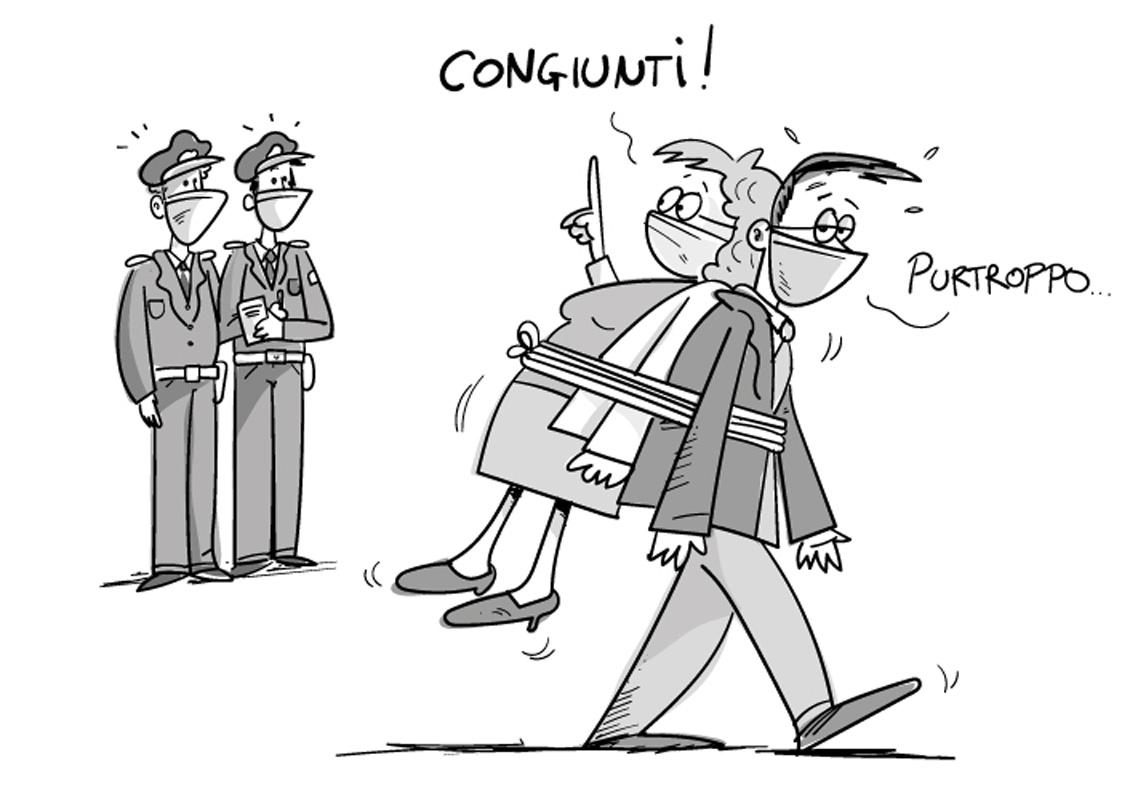This year’s pandemic has left governments and journalists scrambling to find the right words to communicate unprecedented situations. The term “social distancing”, now largely ditched in favour of the more spatial “physical distancing”, was first used in the New York Times in 2006 referring to Avian flu. In Italy, we have witnessed a dusting down of archaic words that would have delighted Dante and his Black Death contemporaries.

“Congiunti” (joined at the hip) illustration by Leo Cardini
Congiunti
A literary term for relatives or friends; coined by the Italian government to refer to spouses, persons who live together and individuals who have a stable emotional bond, relatives within the sixth degree of relationship (such as first cousins once removed) and relatives by marriage within the fourth degree (your spouse’s cousin). Lost? We all were. But now the word has acquired pop status for those rejoined at the hip before being cruelly separated again, Romeo e Giulietta style, by the autumn colour coding system. One of the funnier memes of 2020 was I Promessi Congiunti, a satirical take on Alessandro Manzoni’s 1827 historical novel.
Ristori
A medieval word meaning compensation as well as solace, comfort and an injection of energy. The oddly titled stimulus package, issued in three parts, to assist business owners stricken by government-mandated closures to curb infection. The irony of Pietro Metastasio’s lyrics in his opera libretto Demetrio was not lost on the many restaurateurs affected: Tu non mi fai risolvere, / Speranza lusinghiera; / Fosti la prima a nascere, / Sei l’ultima a morir. / No, dell’altrui tormento / No, che non sei ristoro; / Ma servi d’alimento / Al credulo desir. (You help me not to resolve / Flattering hope / You were the first to be born / You are the last to die / No, torment of others / No, you are no comfort / But help to nourish / credulous desire.) Many took matters into their own hands, pivoting to takeaway and home deliveries, with the guaranteed pittance that provides.
Assembramento
A gathering of people, usually outdoors. Translating it as “congregating” conveys the senescence of the term and the median age of those grouping together, noses popping out a-plenty, as I look out at my neighbourhood piazza. Ma, signori! The etymology points to the Latin adsimilare, around 1250, and was cited figuratively by Dante in his 1294 courtly love text La Vita Nuova: Quantunque volte, lasso!, mi rimembra / ch’io non debbo già mai / veder la donna ond’io vo sì dolente, / tanto dolore intorno ‘l cor m’assembra / la dolorosa mente (Whenever, alas! I remember / that I may never again / see that lady for whom I so grieve, / so much grief is gathered in my heart / by the grieving mind).
Contingentamento
Capping the number of folks allowed in any one place at any one time. At a certain point in the pandemic proceedings, Italy’s businesses were required to hang a sign stating the maximum of customers permitted on their premises based on the floor space. Does anyone check? Rarely. The word comes from the French counterpart introduced in the twentieth century to refer to upper market limits or values for imports and exports.
Focolaio
An outbreak, a cluster, a breeding ground for something not good. Not to be confused with the warm welcome of a focolare, given that both words derive from the Vulgar Latin focularium, meaning fire. We grimace whenever focolaio (or worse still, the plural focolai) is mentioned on the news, especially in relation to the RSA (an acronym for elderly care homes—residenza sanitaria assistenziale—we’ve also learnt in the last twelve months, like the commanding DPCM, Decreto del Presidente del Consiglio dei Ministri, when PM Conte issues unilateral emergency measures, such as not seeing our congiunti for the foreseeable).






